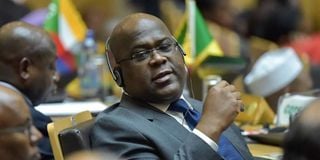
Democratic Republic of Congo's President Felix Tshisekedi.
The political class in the Democratic Republic of Congo is going through a new configuration. Since Félix Tshisekedi's call on October 23 for the "political forces" to unite in what the Congolese Head of
State has described as the "sacred union of the nation", political actors are joining the camp that Tshisekedi intends to put in place.The objective of the Congolese President is to have a hand on all the levers of power to the detriment of the Common Front for the Congo of former President Joseph Kabila, while the coalition -- in power for almost two years- - broke up on December 6.
After the forfeiture of office by Jeanine Mabunda, leader of the National Assembly, President Tshisekedi will continue its fight to replace staff at the head of this chamber of Parliament with a Speaker more favourable to the Head of State. The biggest battle is what was announced by Mr Tshisekedi to "requalify" the majority in the National Assembly.
At present, no one can predict the outcome of this battle, but Joseph Kabila's camp now appears to be in turmoil. Some members of the Common Front for the Congo (FCC) announced their membership in the Sacred Union of Félix Tshisekedi. At the same time, within the FCC, internal divisions came to light and some young executives disowned certain figures from Kabila’s camp, starting with Néhémie Mwilanya, coordinator of the FCC, who is accused of being at the centre of "successive failures of the party".
It is in this context that Kabila left Kinshasa, a city with many elements hostile to him. The former President is staying in the Grand Katanga area where he comes from. After Kolwezi in Lualaba, Kabila went to Lubumbashi, the second largest city in the country.
Some analysts say Tshisekedi's power is growing as the Front Commun pour le Congo appears to be weakening. The Congolese President has received the support of some countries in the European Union.
According to Jean-Marc Châtaigner, Ambassador of the European Union in the Democratic Republic of Congo, "the European Union gives full support to President Félix Tshisekedi and his reforms". At the same time, the same EU announced renewal of restrictive measures against several Congolese figures close to Kabila.
Like the EU, the ambassadors of the US, Japan, South Korea, the UK and Canada expressed their support for the Congolese Head of State, through a joint press release. Their statement was seen by some of the Front Commun pour le Congo leaders as interference in the internal affairs of the country. But the message from the chancelleries was in reality a signal that Tshisekedi will have to count on them too in order to strengthen his power.
Clearly, despite the institutional crisis, for many observers, Tshisekedi is now sole master on board the ship Congo and the question of a majority favourable to Tshisekedi in the National Assembly and a new government is only a matter of time. This is what André Mbata, a pro-Tshisekedi parliamentarian, said.
When he took power in January 2019, the current Head of State had a double commitment. A commitment with his Chief of Staff and ally of Cape for Change (CACH), Vital Kamerhe, and another with the FCC and its leader, Joseph Kabila.
Now, Kamerhe is in prison for eight months while Kabila and his FCC find themselves in a difficult place.
However, some observers say that while the power games may sideline Kabila’s camp from central power in Kinshasa, other ambitious politicians are whetting their appetites ahead of the 2023 election.




No comments :
Post a Comment